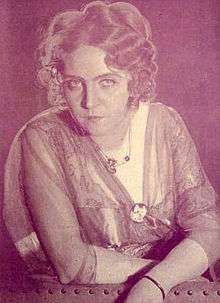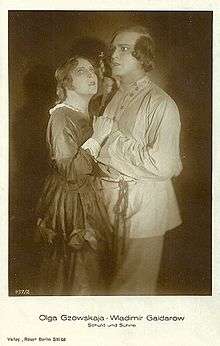Olga Gzovskaya
| Olga Gzovskaya | |
|---|---|
 | |
| Born |
Ольга Владимировна Гзовская 10 October 1883 |
| Died | 2 July 1962 (aged 78) |
| Nationality | Russian |
| Occupation | actor |
Olga Gzovskaya (Russian: Гзовская, Ольга Владимировна 10 (23) October 1883, Moscow - July 2, 1962, Leningrad) was a Russian theater and film actress.
Life
Gzovskaya was born to a family of Moscow customs officials of Polish origin. In 1905, she graduated from the Imperial Drama School at the Maly Theatre,[1] having studied under Aleksandr Pavlovich Lensky.[2] On 1 September 1905 was admitted to the Little Theatre Company (with the first role of Ariel in "The Tempest" by William Shakespeare, that October). From 1905 to 1908, she appeared at the Maly Theatre.[2] In 1907, she met Konstantin Stanislavski at a summer resort and began taking private acting lessons from him.[1] During their classes Stanislavski commented to Gzovskaya that she should perform at the Moscow Art Theatre, which she took as an offer of employment and quit the Maly. As the board had not been consulted, the engagement by the Moscow Art Theatre became contentious and she was forced to tour throughout Russia for the 2008-2009 season.[3] Her employment was also complicated because her fiancé Vladimir Nelidov, who was working at the Maly, was trying to become the manager of the Moscow Art Theatre, but the theater did not trust his reputation.[4] In July 1908, she and Nelidov married.
Gzovskaya returned to the Maly for the 1909-1910 season, but in 1910, she moved to the Moscow Art Theatre.[2] In 1912, she performed a series of engagements in Prague,[5] but was primarily engaged until 1917 at the Moscow Art Theater. Between 1917 and 1919 Gzovskaya returned to the Maly.[2] When Gzovskaya left the Moscow Art Theatre, she severed her studies with Stanislavski, though she tried to promote use of his method in other companies.[6] In 1919, she taught at the studio and toured with the Chialiapin Studio and Opera Studio of the Bolshoi Theatre.[2]

In November 1920, together with her husband, actor Vladimir Gajdarov and a few other artists she went abroad. It happened so unexpectedly that none of the actors were ready to leave. They toured in Ukraine, but the Civil War in 1919, cut them off from Moscow. People were trying to survive, gradually they were joined by other Moscow artists who also found themselves cut off as in other parts of the country, including several actors of the Sinelnikov troupe. As a result, there was quite a large group of well-known theater figures, which included, in addition to Gzovskaya and Gaydarov, Alla Tarasova, Vasily Kachalov, his wife Nina Litovtseva, Olga Knipper, MN Nablotskaya, her husband actor Putyata, N. O. Massalitin, Yury Rakitin, Vladimir Zhedrinsky, MA Kryzhanovskaya, MN Germanova, EN Roshchin-Insarov, Peter F. Sharov and many others. We decided to stay together. This episode in the life of the parents, and the history of the Moscow Art Theater Vadim wrote Shverubovich son Katchalov and Litovtseva.
She worked in Estonia, Latvia and Lithuania, Czechoslovakia, Yugoslavia, Poland, Germany, where, she together with her husband organized a studio. But, not being a professional entrepreneurs, they failed to contain it. At the Berlin City Opera in 1926 Gzovskaya put "Queen of Spades" by Pyotr Ilyich Tchaikovsky. On her return in 1932 to the USSR, she worked in concert organizations in Moscow. In November 1934 she moved to Leningrad, where she continued in concert and presented a few literary compositions. In 1939, she has arrived in the Leningrad Leninsky Komsomol Theatre. However, due to the outbreak of World War II she was evacuated to Novosibirsk, where she continued her theatrical work, staged "Tyrant" by Goldoni and "Little House in Cherkizovo" by Aleksei Arbuzov. In March 1943 she started to work for the Leningrad Pushkin Academic Drama Theatre. where she worked until 1956. In addition, she led the amateur clubs House of Scientists, Club of Seamen, and others.
She was buried in Moscow on Vvedenskoye Cemetery.
Roles
Maly Theatre (Moscow)
- Ariel ( "The Tempest" by Shakespeare),
- Beatrice ( "Much Ado About Nothing" by Shakespeare),
- Erik ( "Youth" M.Dreyera),
- Thea ( "Celebration of Life" G.Zudermana),
- Irene ( "Golden Fleece" S.Pshibyshevskogo),
- Klerhen ( "sunset" F.Beyerleyna),
- Natasha ( "over life" N.Shklyara),
- Kathy ( "In the old Heidelberg" V.Meyer-Forster),
- Desdemona ( "Othello" by William Shakespeare),
- Marina Mniszek ( "Dmitry the Pretender" by Ostrovsky,
- Cleopatra ( "Caesar and Cleopatra" Shaw),
- Miss Mabel Chiltern ( "An Ideal husband" Wilde),
- Cherubino ( "Crazy day or The marriage of Figaro" by P. Beaumarchais).
In 1917–1919 years
- Sophia ( "Woe from Wit" Griboedov),
- Salome ( "Salome" Wilde),
- Lydia Cheboksarova ("Easy money" by Alexander Ostrovsky).
Moscow Art Theatre
- Ophelia (Hamlet by William Shakespeare),
- Tuanet (The Imaginary Invalid by Molière),
- Mirandolina (The Mistress of the Inn by Carlo Goldoni),
- Laura (The Stone Guest by Alexander Pushkin),
- Katerina Ivanovna (The Brothers Karamazov by the same name Dostoevsky's novel),
- Tina (Miserere by S. Yushkevicha),
- Vera Libanova (It Tears Where It Is Thin by Ivan Turgenev).
Leningrad Theatre. Lenin Komsomol
- Beatrice ("Much Ado About Nothing" by William Shakespeare),
- Mamaev ("Even a Wise Man Stumbles" Ostrovsky).
Leningrad Drama Theatre
- The old woman in the "Kremlin Chimes" N. Pogodin;
- Mrs. Eynsfordhill in "Pygmalion," Shaw;
- Grandmother Arsenyev ("Lermontov" BA Lavrenev last role).
Filmography
- Kramskoy Dream (the dream Kramskoy, 1915).
- Lena Rokotoff (Woman with dagger, director Yakov Protazanov)
- The daughter of a landowner (Tasia, director Yakov Protazanov)
- Hurricane (Natasha, director Boris Sushkevich)
- Virgin Mary (the virgin Mary, director Yakov Protazanov), 1916.
- Flurry (Tanya Ch.Sabinskogo) 1917
- Her victim (Aniela, Ch.Sabinskogo); 1917
- And the mystery of the waves swallowed; And the death he was destined (Lilias);
- No blood is necessary (Olga Pernovskaya, director Yakov Protazanov); 1918
- Jenny (Jenny's maid, director Yakov Protazanov)
- Yola (Witches) (bedstraw-Yola, director V.Starevich), 1918;
- The Thieving Magpie (director Alexander Sanin, 1920)
- Love life (Olga, director G.Azagarov, 1923, in Munich, shooting)
- Psyche (psyche, director Yu.Larin 1927, shooting in Berlin)
- Steppe song (Rogoznaya, director Ya.Urinov, 1932-1933).
See also
References
Citations
- 1 2 Ignatieva 2008, p. 106.
- 1 2 3 4 5 Тимофеева 2012.
- ↑ Ignatieva 2008, pp. 107-108, 110.
- ↑ Ignatieva 2008, p. 110.
- ↑ White 2014, p. 168.
- ↑ Ignatieva 2008, p. 116.
Bibliography
- Gzovskaya OV Ways and byways. Portraits. Articles and memories of OV Gzovskaya / All-Russian Theatrical Society. - M .: WTO, 1976. - 432 p.
- Ignatieva, Maria (7 October 2008). Stanislavsky and female actors: women in Stanislavsky's life and art. Lanham, Maryland: University Press of America. ISBN 978-0-7618-4179-1.
- Тимофеева, Ирина, ed. (5 June 2012). "Гзовская Ольга Владимировна". Kino Teatr (in Russian). Moscow, Russia: Кино Театр. Archived from the original on 10 February 2013. Retrieved 18 July 2016.
- White, Andrew, ed. (2014). The Routledge Companion to Stanislavsky. New York, New York: Routledge. ISBN 978-1-136-28185-3.
Literature
- Russian Berlin / Compilation, preface and personalities VV Sorokina. - M .: MGU, 2003. - 368 p. - 3 000 copies. - ISBN 5-211-04077-5. (A lane.)
- This article incorporates information from the equivalent article on the Russian Wikipedia.